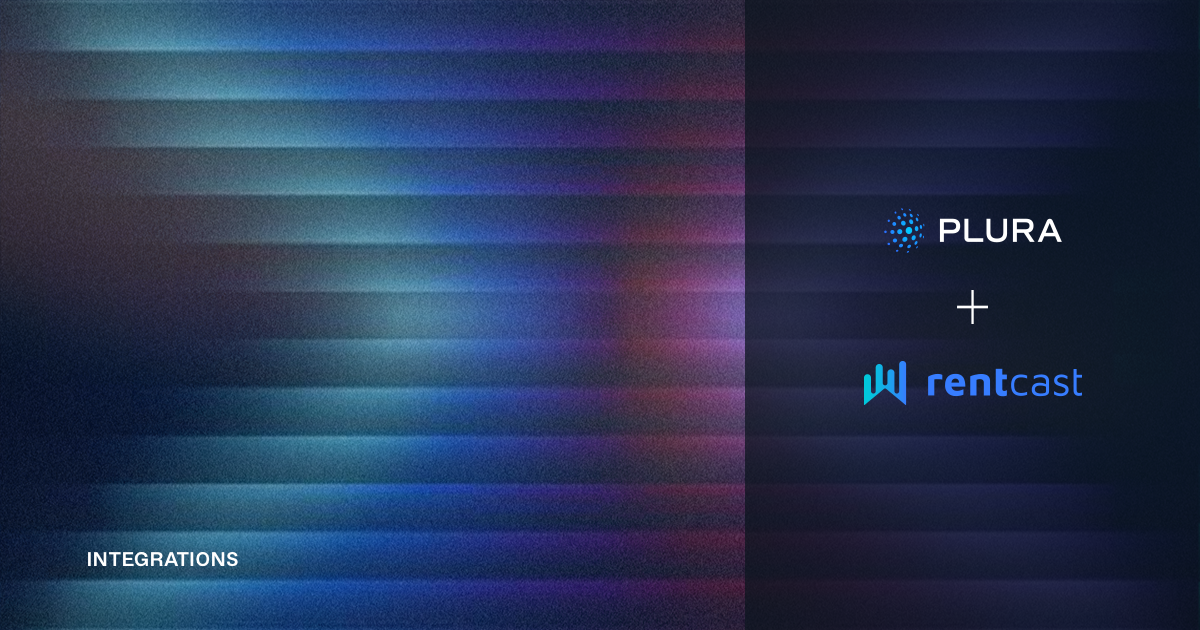Key Takeaways
Plura AI's direct RentCast integration delivers instant access to over 140 million property records with 96% residential coverage across all 50 US states, transforming how businesses leverage conversational AI for customer engagement. Companies implementing data-driven personalization in customer interactions typically achieve 10-15% revenue increases, with organizations using customer analytics intensively being 23 times more likely to outperform competitors in new customer acquisition. The integration addresses a significant market opportunity: while 96% of home buyers use online tools and 81% of real estate professionals find technology very impactful, only 28% currently leverage AI and machine learning in their business operations.
Why Real-Time Property Intelligence Changes Enterprise Communications
The commercial real estate and residential property markets have entered an era where customer expectations demand instant, accurate responses backed by comprehensive data. Traditional workflows that require manual property research, delayed callbacks, or fragmented data sources create friction that drives potential customers to faster competitors.
Plura AI's integration with RentCast eliminates this friction by embedding real-time property intelligence directly into conversational workflows. When a potential buyer texts about a property, calls to inquire about rental rates, or engages through webchat about insurance coverage, the AI agent instantly accesses valuation data, comparable properties, ownership records, market trends, and detailed property characteristics without breaking conversation flow.
RentCast processes over 500,000 daily property updates and provides rental and sales listings typically within 12-24 hours of publication, with market analytics available for most US zip codes including historical trends since 2020 for rentals and 2024 for sales. This data freshness ensures that conversational responses reflect current market conditions rather than outdated information that could undermine credibility or result in missed opportunities.
The business case for real-time property data integration extends beyond customer satisfaction. Research shows that lead response time dramatically impacts conversion rates, with companies responding within 5 minutes being 21-100 times more likely to qualify leads than those taking 30 minutes or longer. When combined with relevant property intelligence, this speed advantage compounds: customers receive not just fast responses, but fast and informed responses that demonstrate expertise and build trust immediately.
Strategic and Compliance Obligations Drive Technology Adoption
Real estate, insurance, and financial services firms face increasing regulatory scrutiny around AI systems, data accuracy, and fair housing compliance. The Department of Housing and Urban Development's May 2024 guidance on AI in tenant screening and housing-related advertising clarifies that housing providers remain fully liable for Fair Housing Act compliance even when using third-party AI systems or algorithms.
This regulatory environment makes the choice of technology partners critical. Plura AI's integration with RentCast addresses compliance requirements through several mechanisms. First, the platform's conversational AI maintains complete audit trails of all property data usage and customer interactions, providing the transparency that regulators require. Second, RentCast's multi-source data validation and normalization processes support accuracy requirements under the Fair Credit Reporting Act and Fair Housing Act frameworks. Third, the stateful AI architecture enables human oversight and intervention, ensuring that automated systems enhance rather than replace human judgment in housing decisions.
For insurance providers, accessing accurate property characteristics, replacement values, and risk factors directly in customer conversations supports both competitive pricing and underwriting accuracy. Mortgage lenders benefit from instant equity calculations, lien information, and comparable sales data that accelerate qualification while maintaining compliance with lending regulations. Marketing agencies and lead generation firms must navigate both TCPA consent requirements and fair housing advertising standards when targeting property-related campaigns—making transparent, auditable data sources essential for enterprise clients.
Smarter conversations drive real results
Get a demoOperational Impact on Call Volume, AI Integration, and ROI
The RentCast integration transforms operational metrics across multiple dimensions. For real estate brokerages, agent productivity increases dramatically when property research that previously required 10-15 minutes of manual work—searching MLS databases, pulling comparable sales, calculating price per square foot, researching neighborhood trends—occurs automatically during customer conversations. This time savings compounds across hundreds or thousands of monthly interactions.
Property management companies gain competitive advantages in both acquisition and retention. When prospective tenants inquire about available units, AI agents can instantly compare rental rates against market averages for similar properties, explain pricing rationale with data, and identify value-added amenities that justify premium positioning. For portfolio management, the ability to pull market analytics for multiple properties simultaneously enables dynamic pricing strategies that optimize occupancy rates and revenue per unit.
Insurance providers implementing conversational AI with property intelligence report significant improvements in quote conversion rates. When customers receive instant quotes based on actual property characteristics—square footage, construction year, roof condition, proximity to fire stations, claims history for the area—rather than estimated or self-reported data, both accuracy and trust increase. The result is higher quote-to-policy conversion and reduced claims from inaccurate coverage specifications.
According to McKinsey research on personalization, fast-growth companies could capture over $1 trillion in value across US industries through top-quartile personalization execution, with organizations using customer analytics intensively achieving 19 times higher profitability than competitors. The integration delivers measurable ROI through multiple channels: increased conversion rates from faster, more informed responses; reduced labor costs from automated property research; improved customer retention through superior experience; and competitive differentiation in crowded markets where responsiveness and expertise separate winners from commodity providers.
Consider the economics for a mid-sized mortgage lending operation: if 5-minute response time yields 21-100x conversion improvement over 30-minute response, and instant property intelligence enables immediate product matching and pre-qualification, a lender processing 1,000 monthly inquiries could see dramatic improvements in funded loan volume from the same marketing spend. Even conservative estimates of 10-15% revenue lift translate to substantial annual impact for enterprises processing millions in monthly origination volume.
Risk and Implementation Challenges Require Strategic Approach
While the integration delivers clear value, successful implementation requires addressing several considerations. Data accuracy and coverage vary by property type and geographic location, with 96% residential coverage representing strong but not universal availability. Businesses must implement fallback procedures for properties outside the database or situations where data gaps exist. The conversational AI should gracefully handle these scenarios by acknowledging limitations, offering to research manually, or pivoting to alternative information sources.
Integration complexity depends on existing technology infrastructure. Companies with modern CRM systems, API-friendly communication platforms, and cloud-based workflows typically complete implementation within 2-4 weeks. Legacy systems may require middleware, data transformation layers, or phased rollout approaches that extend timelines but ensure stability. The RentCast API's support for 6,000+ Zapier integrations and no-code platforms like Bubble and Make.com provides multiple integration paths for businesses with varying technical capabilities.
Training and change management present human challenges alongside technical ones. Customer service representatives, real estate agents, loan officers, and insurance agents accustomed to traditional research methods must learn to trust AI-powered property intelligence and understand when human judgment should override automated recommendations. Successful implementations include comprehensive training programs, gradual capability rollout, and continuous feedback loops that refine conversational scripts based on real-world usage patterns.
Cost considerations include RentCast API pricing based on query volume, Plura AI platform fees, and internal development or integration consulting expenses. However, research on data integration platforms shows enterprise customers typically achieving 295-633% ROI over 3-year periods with less than 6-month payback periods. The key is matching integration scope to business priorities—starting with high-impact use cases that deliver quick wins, then expanding to additional property data types and customer segments as value becomes apparent.
How Real Estate Professionals, Agencies, and Enterprises Should Respond
The integration creates immediate opportunities for businesses across multiple sectors. Real estate agents and brokerages should prioritize implementing property intelligence for initial buyer and seller inquiries, where instant credibility and responsiveness most significantly impact conversion. When a buyer asks about a property they saw online, an AI agent that immediately provides comparable sales, price history, neighborhood statistics, school ratings, and market appreciation trends demonstrates expertise that builds trust and accelerates the decision process.
Property management companies should focus on rental market analytics and competitive positioning. The ability to justify rental rates with real-time market data, identify undervalued acquisition opportunities through ownership records and propensity scoring, and automate property research workflows for portfolio analysis delivers compound advantages.
Insurance providers gain competitive advantages through instant quoting capabilities. When a homeowner calls about policy renewal, accessing current property valuation, replacement cost estimates, and neighborhood risk factors enables personalized pricing that balances competitiveness with accurate underwriting. The speed advantage—providing quotes in minutes rather than hours or days—often determines whether prospects convert or continue shopping with competitors.
Mortgage lenders and banks should implement property intelligence at the qualification stage. Instant access to home values, equity positions, outstanding liens, and comparable sales data enables loan officers to match borrowers with appropriate products immediately, increasing both customer satisfaction and application completion rates. For refinance operations, the ability to proactively identify customers with increased equity or favorable market conditions drives outbound campaign effectiveness.
Investment firms and fund managers should leverage ownership data, market trends, and propensity scoring for deal sourcing. The combination of property intelligence and conversational AI enables sophisticated prospecting workflows—identifying pre-market opportunities, qualifying seller motivation, and prioritizing outreach based on acquisition criteria. When integrated with CRM systems and deal flow management platforms, these capabilities compress timelines from opportunity identification to initial contact.
Marketing agencies and lead generation firms serving real estate, insurance, lending, or property management clients should position the integration as a premium service differentiator. Campaigns powered by precise property targeting—owner demographics, equity positions, property characteristics, market propensity data—deliver higher-quality leads that convert at significantly improved rates. The ability to provide clients with instant property intelligence during lead follow-up creates competitive moats against agencies offering only contact information without supporting data infrastructure.
No spam. Just the latest releases and tips, interesting articles, and exclusive interviews in your inbox every week.




